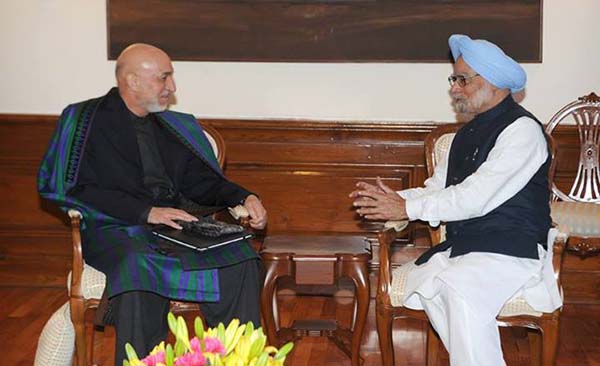As part of his regional tour, President Hamid Karzai is visiting India and is pushing for enhanced security and economic cooperation between the two countries. His trip to India has coincided with the security agreement impasse between Kabul and Washington and is coming after his closely-watched visit from Tehran. In India, President Karzai once again defied the pressure exerted by the United States for signing the bilateral security agreement, the BSA, saying that he was not going to be intimidated by the US over the security agreement.
Karzai’s regional tour of Iran and India has closely become intertwined with the ongoing standoff between Kabul and Washington and the prospect of a US military presence in Afghanistan beyond 2014. Many view the timing of President Karzai’s regional trip related to the ongoing standoff with Washington as he has been seeking boosting security and economic relations between Afghanistan and the regional countries.
In India, President Karzai is pressing Indian government for a deeper security support and defense ties as the US-led international coalition is set to withdraw from the country by end of 2014. The Afghan government had previously demanded India to provide military hardware such as tanks and artilleries for Afghanistan’s security forces and enhance defense relations with Afghanistan. However, India seems to be more cautious over the possible fallouts of an enhanced defense and security ties between New Delhi and Kabul as Pakistan is specifically concerned with Indian presence in Afghanistan. So far India has refrained to accept Afghanistan’s demand for equipping the country with sensitive military hardware. At the same time, India seems eager to enhance security cooperation with Afghanistan to help the country fighting an implacable insurgency after the NATO withdrawal.
A balanced regional tie is critical for Afghanistan’s security and economic development after NATO ends its mission by next year. The Afghan government’s move to enhance relations with neighboring countries and sign mutual cooperation pacts with the regional powers can be interpreted as an attempt to gain that balance of relations with neighbors and regional countries. Given the regional impacts of the Afghan conflict, the Afghan government knows very well that regional cooperation on Afghanistan will remain a key factor in resolving the conflict and help the government in fighting the insurgency. Despite that the security agreement with the US is the only viable source of sustained security support, regional security cooperation and support for military presence of the United States would remain essential for peace in Afghanistan.
As a promising sign of a regional consensus on post-NATO Afghanistan, the regional powers, with the exception of Iran, are supporting a residual force of the US to stay in Afghanistan beyond 2014 to help the country fighting the Taliban. India is seen as an avid proponent of US prolonged presence in Afghanistan, while Pakistan which concerned with the consequence of complete withdrawal of the United States on its internal security is happy with continued presence of US military in Afghanistan. For Pakistan, there is much at stake if the United States chooses to fully withdraw from Afghanistan. The country, which is plagued by Islamist militancy, ethnic and sectarian violence, fears to further plunge into sectarian violence and militants’ insurgency in case the US forces withdraw from Afghanistan completely and leave the country with the possible resurgence of the militant groups.
This year, Afghanistan and Pakistan have developed mutual relations and cooperation on the Afghan peace initiative with the Taliban. Pakistan has supported security agreement between Kabul and Washington and Pakistan’s Prime Minister Nawaz Sharif has openly backed the security agreement between Afghanistan and the United States. Amid the renewed interests in regional cooperation on post-NATO Afghanistan, China and Russia are also in favor of a prolonged US presence in Afghanistan fearing that possible fallouts of US withdrawal could destabilize the Central Asia and the region. For China, presence of the United States in Afghanistan beyond 2014 is meaning stability for its vast investments in Afghanistan.
Ironically, as President Karzai is pushing for a deeper defense ties with India and other regional powers as he is defying the US over the bilateral security agreement, the New Delhi and others are encouraging him to sign the security agreement with Washington on time and avoid a possible failure over the pact that is crucial for Afghanistan’s future stability. Ahead of president Karzai’s visit to India, American officials expressed hope that India would encourage Karzai to sign the deal. Given that India is closely cooperating with the United States on Afghanistan, it does not seem to ignore American position on Afghanistan’s security needs – particularly Kabul’s demand for deeper defense ties and supply of military hardware – in any reconsideration of security and defense ties with Kabul.
However, Iran has not shied to openly oppose a prolonged presence of the United States in Afghanistan. Expressing his opposition to the prospect of a prolonged US military presence in Afghanistan, Iranian President Hassan Rouhani said that the country was “concerned about tension arising out of the presence of foreign forces in the region, believing that all foreign forces should get out of the region and the task of guaranteeing Afghan security should be entrusted to the country’s people.” President Karzai’s recent overture to Tehran and the surprise announcement of seeking a mutual cooperation pact with the country is in part viewed as an attempt to ease Tehran’s concerns of US military presence in Afghanistan.

